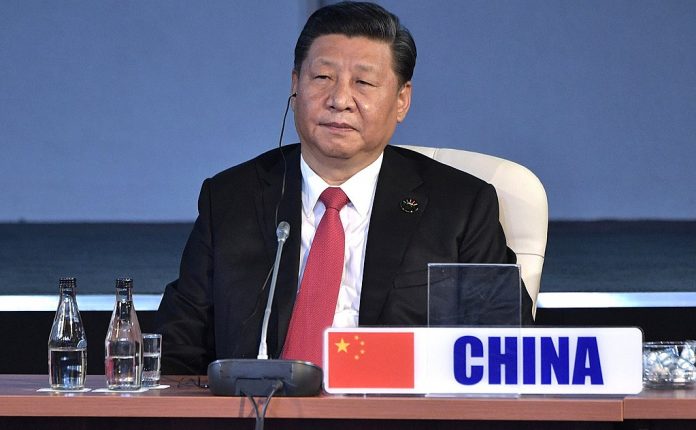Last week, the war of words between Washington and Beijing reached new heights of animosity. The Trump administration continues to blame China’s appalling management of the COVID-19 pandemic for the increasing rate of deaths in the U.S. A strategy, no doubt, aimed to appease criticism over his own incompetent handling of the health crisis. China has responded with a string of vile accusations, characterising the White House as “lunatic”, “evil” and “shameless”. Many news outlets and analysists have interpreted this exchange of insults as a sign that a new Cold War is on the horizon. Comparisons with the Cold War are always popular every time tensions between superpowers re-emerge. But resorting to headline-grabbing outdated comparisons are only going to cause unnecessary alarmism, at a time when global anxiety levels are already over the roof. This is not a Cold War, it is a war of words and, frankly, one that we have already seen.
Trump’s only objective is to win the election in November. Singling out China as the scapegoat for U.S. economic and security problems is a strategy that he already used during his 2016 campaign. By accusing China of being a currency manipulator, a theft of intellectual property, a cyberterrorist and of having made up the hoax of global warming in order to damage American manufacturing industry, he appealed to an isolationist electoral base that won him the Electoral College votes. Beijing played along, replying with its own accusations and threats, but, in reality, Sino-American relations turned out to be much less bellicose than excepted once Trump got into the White House. Even the so called “trade war”, marked by hyperbolic and aggressive rhetoric, resulted in a limited deal in 2019 that clearly showed that the administration was amenable to a compromise. We are looking at a similar scenario now. Trump is attacking China to distract from his poor record in office and undermine the Democratic candidate, Joe Biden’s campaign. Indeed, his new “Obamagate” mantra includes, among the many charges, references to the former president’s weakness in dealing with the Communist adversary and it has prompted Trump’s supporters to create a new website “Beijing Biden” to collect money to address the perceived China threat.
But the rhetoric is not a reflection of either country’s strategy. Why? Because today world is no longer governed by a bipolar order. China is not the Soviet Union and it is not interested in an ideological war with the Western world. Quite the contrary, a confrontation could deplete both Beijing and Washington’s resources, jeopardise their market-driven societies and leave room for other nations to rise on the international stage. No matter what strategic differences the two countries might have, they know it is not in their interest to start a confrontation. In a globalised world, cooperation, or at least coexistence, is necessary to find adequate solutions to transnational challenges that go beyond political borders. COVID-19 is sadly a perfect example of the necessity to maintain an open dialogue. Using the pandemic as a political weapon to eliminate the adversary would be counterproductive at the moment. Both China and the U.S. know they are essential partners in the fight against the virus and saving the global economy. They will need to work together to develop medical treatments. Their economies are intertwined or interdependent, as American political scientist, Joseph Nye has written. $269 billion in the form of Foreign Direct Investment (FDI) went into China last year. In turn, Beijing’s FDI in the U.S. amounted to $145 billion. The U.S. trade in goods with China equals 8 percent of exports and 19 percent of imports. Overall, their financial relationship is above $5 trillion.
The climate crisis, the first challenge the two giants will need to tackle in a post-COVID-19 world, is another example of the necessity for cooperation and collaboration. While Trump’s decision to withdraw from the Paris agreement left the entire international community baffled, both countries understand they share a common security threat. As their greenhouse gases emissions are the major contributors to the planet’s rising temperatures, China and the U.S. need to develop cooperative projects that can transform our fossil fuels based global economy into a sustainable one. The climate crisis is also a geopolitical threat. The melting ice in the Arctic for example, is opening up new trade routes and access to natural resources. Russia has been very quick in claiming its stake over the region. As there is no overarching treaty governing the Arctic, China, which considers itself a “near Arctic state”, and the U.S. have a shared interest in joining forces to contain Russian expansive ambitions in the area. Similarly, as two nuclear nations, they are both supporters of an international non-proliferation treaty to slow down other countries’ acquisition of weapons of mass destruction.
Differences between the two nations exist and it is very unlikely, they will ever embark on a “special relationship” kind of alliance. But health, economy, climate and military are the cornerstones of any country’s foreign policy aimed to protect its national security. While both Trump and China will continue to use their rhetoric for political manoeuvring and to appeal to their domestic public opinion, they have clearly,no interest in re-starting a Cold War.
The views and opinions expressed in this article are those of the author.

The author is a historian of twentieth century US Foreign Policy at the University of Reading, UK. She specialises in Sino-American relations since the Cold War and has published extensively on the topic. She is currently the chair of the British Association of International Studies’ US Foreign Policy Working Group.


